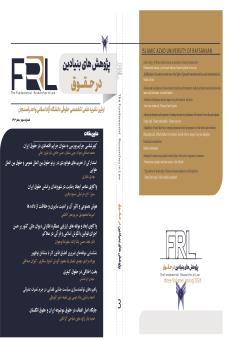The position of the principle of fairness in Iranian subject law and English law
Subject Areas :
Hamid Bazrpach
1
![]() ,
Moien Sabahi Garaghani
2
,
Moien Sabahi Garaghani
2
1 - Department of Law, Karaj Branch, Islamic Azad University, Karaj, Iran
2 - Department of Law, Faculty of Humanities, Islamic Azad University, Kerman, Iran.
Keywords: the principle of fairness, contract adjustment, law interpretation, English law,
Abstract :
When the legal rules have defects, the institution of justice is a means to adapt and adjust the legal rules. Fairness originates from the human conscience, which has a desire to implement justice, and it gives the lawyer a special ability to look at the law from a different perspective. Fairness is a special form of justice that corrects a rule that is incomplete or insufficient according to its general nature. Fairness emphasizes the spirit of the law and it is with fairness that the sentence of the law agrees and harmonizes with the purpose of the legislator. The purpose of this research is the comparative analysis of the concept and nature of fairness as a source of legal rules and the role of this institution in the interpretation of contracts in the legal systems of Iran and England. This research aims to answer these questions: can fairness be a source of contractual obligations or not? Can fairness play a role in interpreting contracts? And also, does fairness have an individualistic or social nature? Fairness should be recognized together with other sources of law and alongside them, and by resorting to this institution, it is possible to deviate from the appearance of the terms of the law and interpret it in a way that leads to a fair result, and also fairness has a social nature. and is consistent with the collectivists' understanding of the contract.
1. احمدزاده، فتح اله ،فرهنگ کلمات عربی متداول در بان فارسی، انتشارات باقرالعلوم، چاپ اول، پائیز .1363
2. ارسطو، سیاست، ترجمه حمید عنایت، تهران، انتشارات نیل، 1337
3. افشار، فرشید، پایان نامه کارشناسی ارشد، رشته حقوق، عنوان: دادرسی روستایی در ایران (خانههای انصاف) و بررسی تطبیقی با دادرسی روستایی در هند (پنجایابهای عدالت)، دانشگاه شهید بهشتی ،1353.
4. امام علی (ع) ،نهج البلاغه، بخش دوم وسوم: نامهها- سخنان حکمت، ترجمه اسداله مبشری، دفتر فرهنگ اسلامی ،چاپ دهم،1366.
5. باریکلو، علیرضا، خزایی، سیدعلی، اصل حسن نیت و پیامدهای آن در دوره پیش قراردادی؛ با مطالعه تطبیقی در حقوق انگلیس و فرانسه، مجله حقوقی دادگستری، شماره 75، زمستان .1313
6. تونکار، حجت فلاح، پایان نامه کارشناسی ارشد، رشته تاریخ، عنوان: عدالت و آزادی از دیدگاه اندیشه گران دوران ناصری( 5264-5959)، دانشگاه تربیت مدرس، بهمن 1375.
7. جعفری لنگرودی، محمدجعفر، ترمینولوژی حقوق، کتابخانه گنج دانش، چاپ چهارم، زمستان 1368.
8. جلالی، محمود، آرایی، حمید، بررسی تطبیقی دکترین تغییر بنیادین اوضاع و احوال در حقوق ایران و حقوق بین الملل، مجله نامه مفید، شماره 82، اسفند 1381.
9. حبیبی، حسن، منطق حقوقی و انفورماتیک حقوقی، انتشارات اطلاعات، چاپ اول، تهران ،1373.
10. شفائی، محسن، ایمان و وجدان ، ناشر: مؤلف ، چاپ سوم ، پاییز 1367.
11. شهیدی، مهدی، تشکیل قراردادها و تعهدات، جلد اول، نشر حقوقدان، چاپ اول، تهران پائیز 1377.
12. صاحبی، مهدی، تفسیر قراردادها در حقوق خصوصی ، انتشارات ققنوس، چاپ اول ، تهران ، 1376 .
13. صلیبا، جمیل، فرهنگ فلسفی، ترجمه: منوچهر صانعی دره بیدی، انتشارات حکمت، چاپ اول، پاییز .1366
14. کاتوزیان، ناصر، فلسفه حقوق ، مجلدات1، 2 و 3 ، شرکت سهامی انتشار، چاپ اول ، تهران ، 1377.
15. مطهری، مرتضی، عدل الهی، اتشارات صدرا، چاپ هفتم، آبان،1372
16. نجومیان، حسین، مبانی حقوق در ایران، موسسه چاپ و انتشارات آستان قدس رضوی ، چاپ دوم ، مشهد، 1376.


